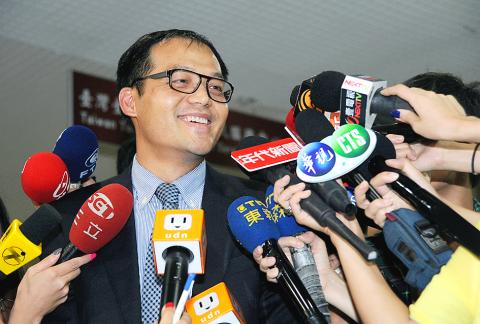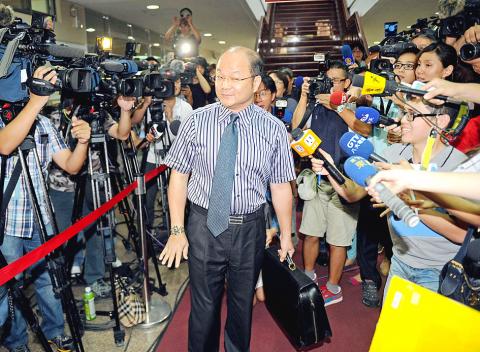Facing accusations of influence peddling, Legislative Speaker Wang Jin-pyng (王金平) yesterday took his battle with the Chinese Nationalist Party (KMT) and President Ma Ying-jeou (馬英九) to the Taipei District Court in the hope of retaining his KMT membership and legislative speaker position.
The court held its first session yesterday afternoon to review Wang’s challenge of a KMT decision, which revoked the 72-year-old politician’s membership in the party for his role in alleged illegal lobbying.
The court did not hand down a ruling yesterday. According to the Code of Civil Procedure (民事訴訟法), the court should make a ruling within seven days of a provisional injunction.

Photo: Liu Hsin-de, Taipei Times
Wang and Ma did not attend the court session.
Former Democratic Progressive Party legislator and attorney Chiu Tai-san (邱太三), who represented Wang, filed an injunction against the revocation with the Taipei District Court as well as a civil lawsuit seeking to overrule the KMT’s decision.
The Wang camp filed an additional temporary restraining order on Wednesday night, which argued that Wang should retain his position as speaker.

Photo: CNA
Hsu Ying-chieh (許英傑), another lawyer for Wang, said his client claimed that the KMT’s decision had violated the principle of proportionality since the party did not revoke the party membership of former Executive Yuan secretary-general Lin Yi-shih (林益世) and KMT Taipei City councilor Lai Su-ju (賴素如), both of whom have been indicted for corruption.
Neither did the KMT grant Wang the 20-day appeal period stipulated in the party’s charter, Hsu said.
The KMT’s Anti-Corruption Committee could still reverse the punishment on appeal — but only if the punishment is found to be non-compliant with party rules. Even if that happens, Wang will still be out of the party until the committee makes a ruling, sources in the KMT said.
In 2010, the KMT revised its rules so that disciplinary measures would remain in effect even during appeals, they said.
The KMT will not interfere with Wang’s move to request a court review of the Central Evaluation and Discipline Committee’s decision, the sources said, adding that it is his right to pursue the course of action.
Wang said he hoped that he could retain the speaker position to resolve a series of important issues that are related to social and political stability, including a controversial cross-strait service trade agreement, a referendum proposal on the Fourth Nuclear Power Plant and the central government’s budget plan, the lawyer said.
Wang has been a major player in the KMT and since becoming speaker of the legislature in 1999, has enjoyed popularity among both ruling and opposition lawmakers. He started his legislative career when he was elected in 1975. He was a legislator-at-large in 2004.
Chen Ming (陳明), a lawyer who represented the KMT, said the KMT urged the court to uphold its decision to expel Wang for interfering with the judiciary.
“Which deserves to be protected more? Wang’s political career or the KMT’s pledge and determination to uphold the law?” Chen asked reporters.
Earlier yesterday, the legislature’s secretariat confirmed that it had received a notice regarding the revocation of Wang’s KMT membership from the Central Election Commission (CEC) in an electronic file on Wednesday night.
Gao Chiu-lai (高秋來), director of the legislature’s Conference Department, said that the notice would be processed in line with normal procedures.
According to the Civil Servants Election and Recall Act (公職人員選舉罷免法), the legislature is required to void Wang’s status as a lawmaker and send the result back to the CEC so that it can announce the name of a KMT legislator-at-large nominee to take over Wang’s seat. Under the law, the legislature is not subject to a prescribed period to complete the process.
CEC Vice Chairman Liu I-chou (劉義周) reiterated yesterday that Wang lost his status as a legislator the same day his party membership was revoked.
Liu said he was surprised that many people were still unsure about Wang’s legislative status despite the developments.
Wang said he had no comment on Liu’s views that his legislative seat had been invalidated immediately after the KMT ruled on the case on Wednesday.
Additional reporting by CNA

CHAOS: Iranians took to the streets playing celebratory music after reports of Khamenei’s death on Saturday, while mourners also gathered in Tehran yesterday Iranian Supreme Leader Ayatollah Ali Khamenei was killed in a major attack on Iran launched by Israel and the US, throwing the future of the Islamic republic into doubt and raising the risk of regional instability. Iranian state television and the state-run IRNA news agency announced the 86-year-old’s death early yesterday. US President Donald Trump said it gave Iranians their “greatest chance” to “take back” their country. The announcements came after a joint US and Israeli aerial bombardment that targeted Iranian military and governmental sites. Trump said the “heavy and pinpoint bombing” would continue through the week or as long

TRUST: The KMT said it respected the US’ timing and considerations, and hoped it would continue to honor its commitments to helping Taiwan bolster its defenses and deterrence US President Donald Trump is delaying a multibillion-dollar arms sale to Taiwan to ensure his visit to Beijing is successful, a New York Times report said. The weapons sales package has stalled in the US Department of State, the report said, citing US officials it did not identify. The White House has told agencies not to push forward ahead of Trump’s meeting with Chinese President Xi Jinping (習近平), it said. The two last month held a phone call to discuss trade and geopolitical flashpoints ahead of the summit. Xi raised the Taiwan issue and urged the US to handle arms sales to

State-run CPC Corp, Taiwan (CPC, 台灣中油) yesterday said that it had confirmed on Saturday night with its liquefied natural gas (LNG) and crude oil suppliers that shipments are proceeding as scheduled and that domestic supplies remain unaffected. The CPC yesterday announced the gasoline and diesel prices will rise by NT$0.2 and NT$0.4 per liter, respectively, starting Monday, citing Middle East tensions and blizzards in the eastern United States. CPC also iterated it has been reducing the proportion of crude oil imports from the Middle East and diversifying its supply sources in the past few years in response to geopolitical risks, expanding

An Emirates flight from Dubai arrived at Taiwan Taoyuan International Airport yesterday afternoon, the first service of the airline since the US and Israel launched strikes against Iran on Saturday. Flight EK366 took off from the United Arab Emirates (UAE) at 3:51am yesterday and landed at 4:02pm before taxiing to the airport’s D6 gate at Terminal 2 at 4:08pm, data from the airport and FlightAware, a global flight tracking site, showed. Of the 501 passengers on the flight, 275 were Taiwanese, including 96 group tour travelers, the data showed. Tourism Administration Deputy Director-General Huang He-ting (黃荷婷) greeted Taiwanese passengers at the airport and